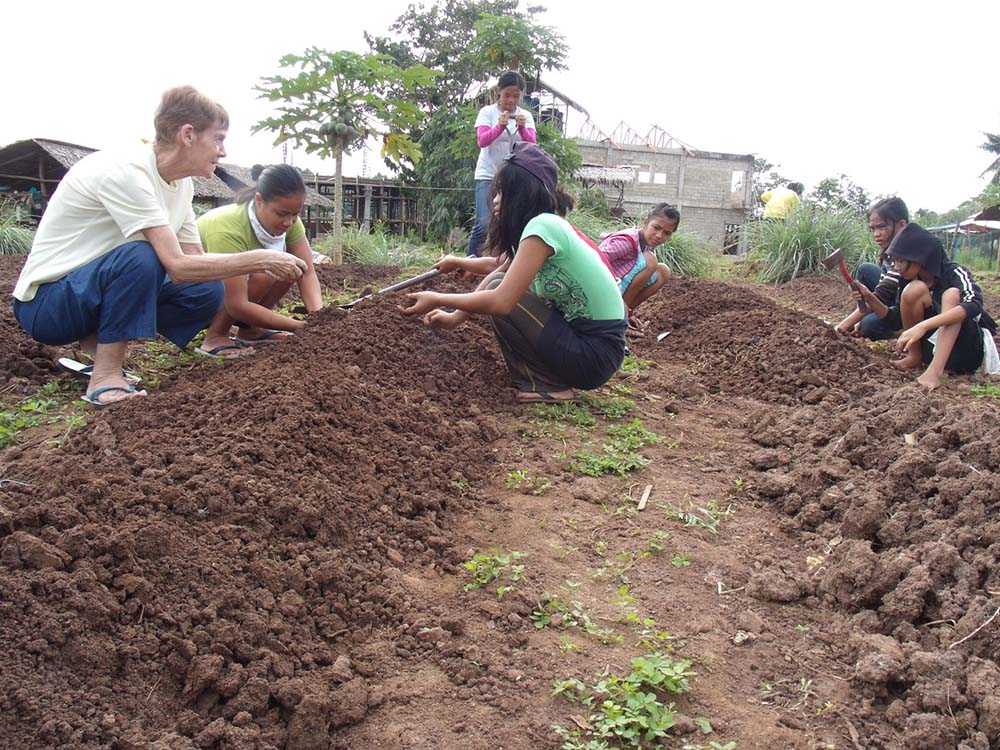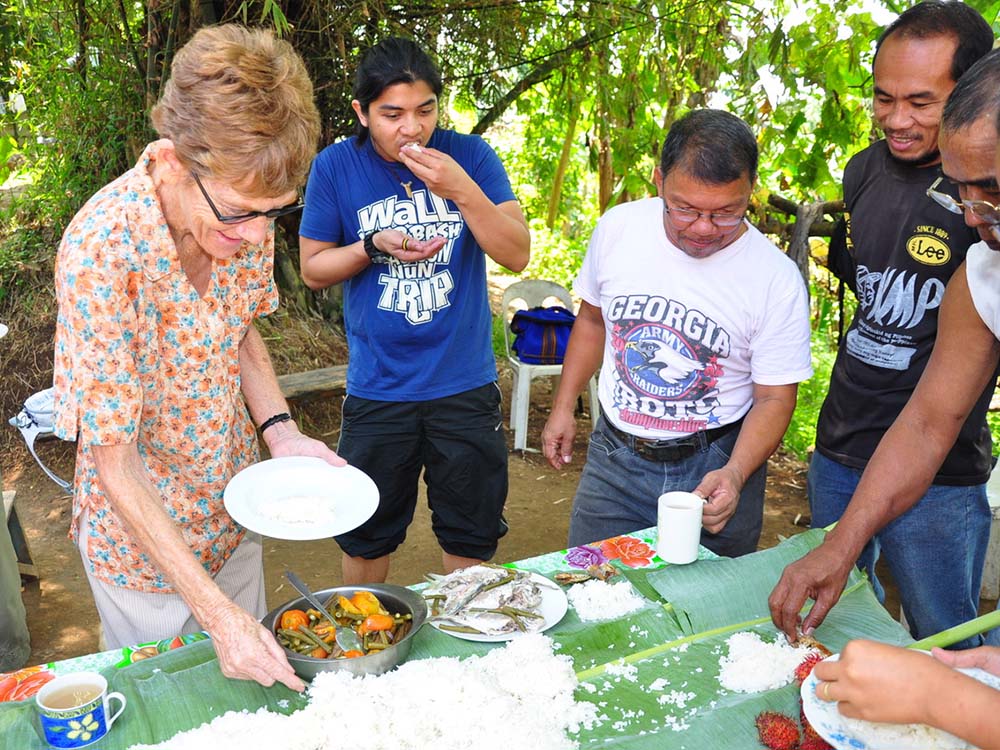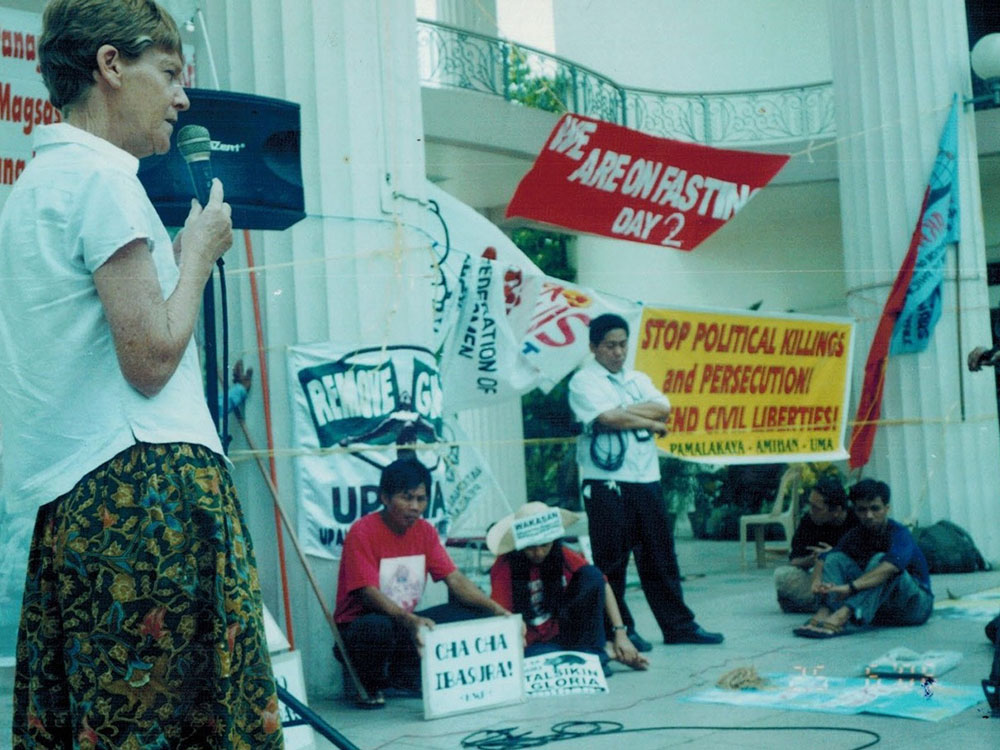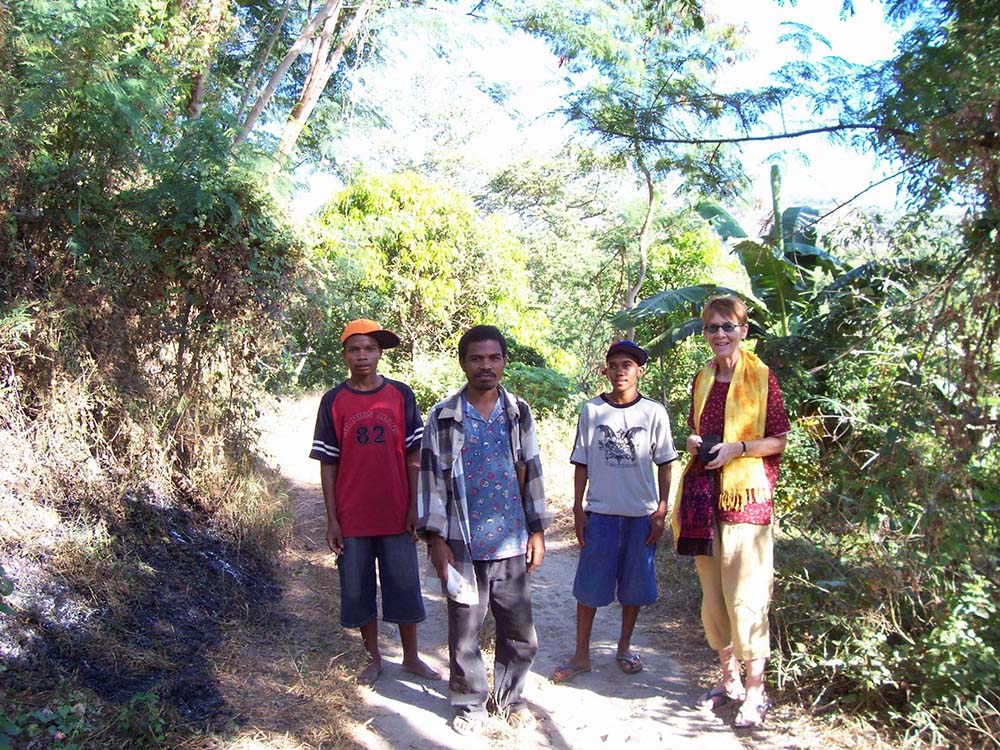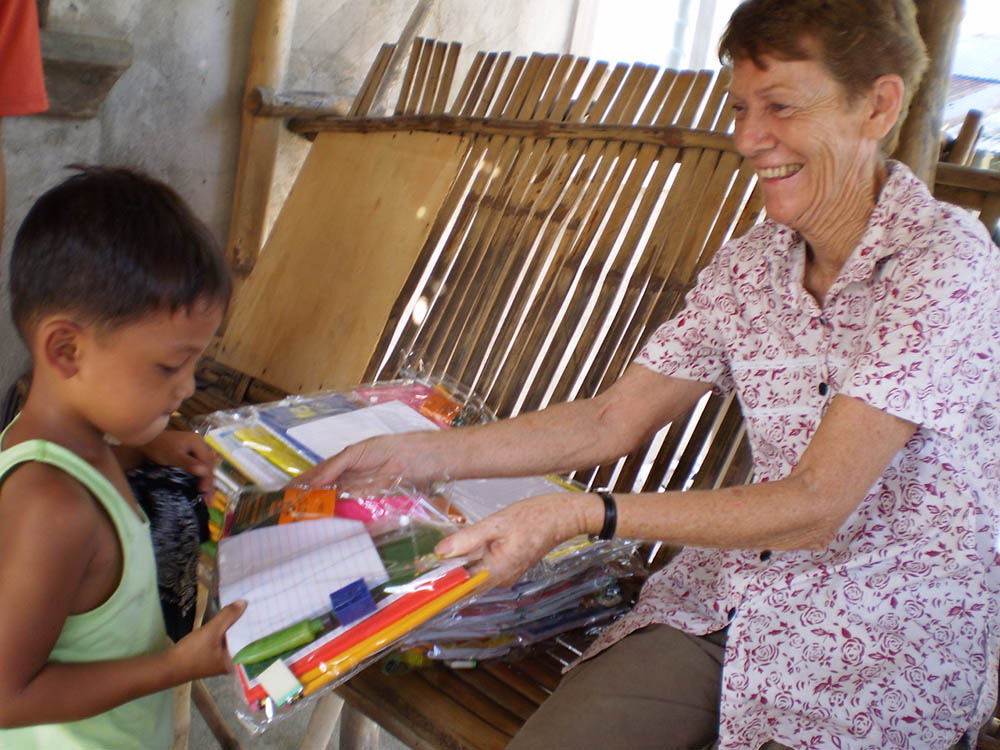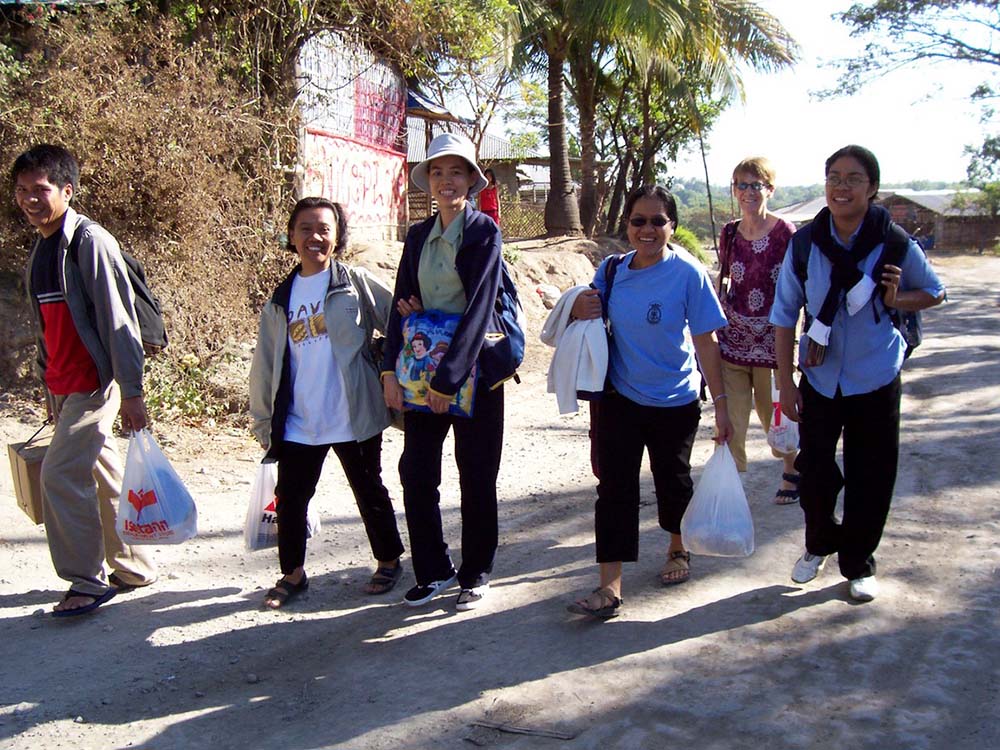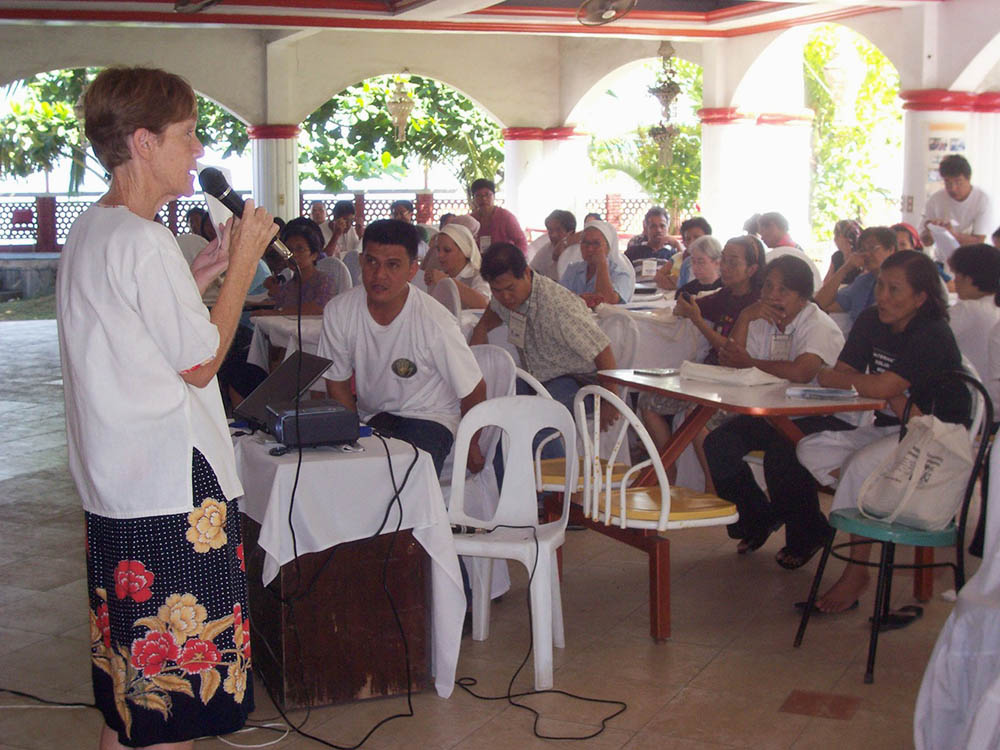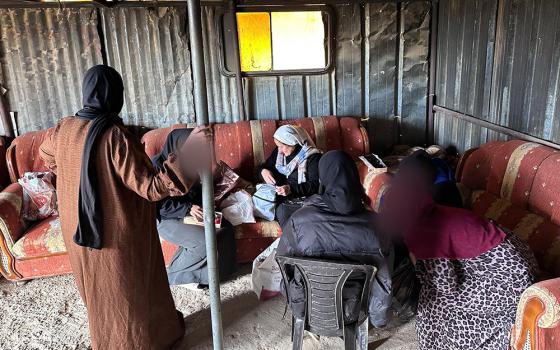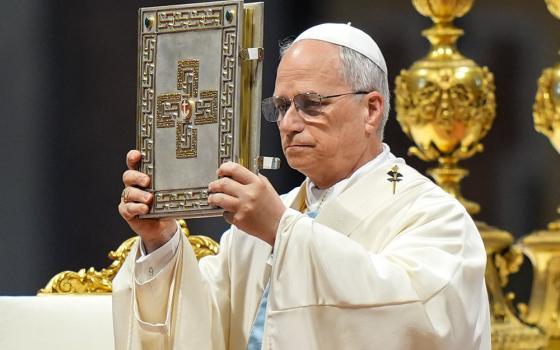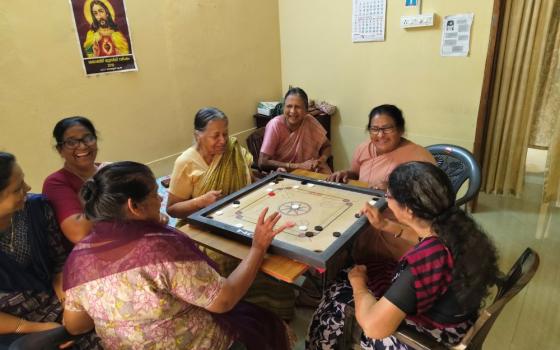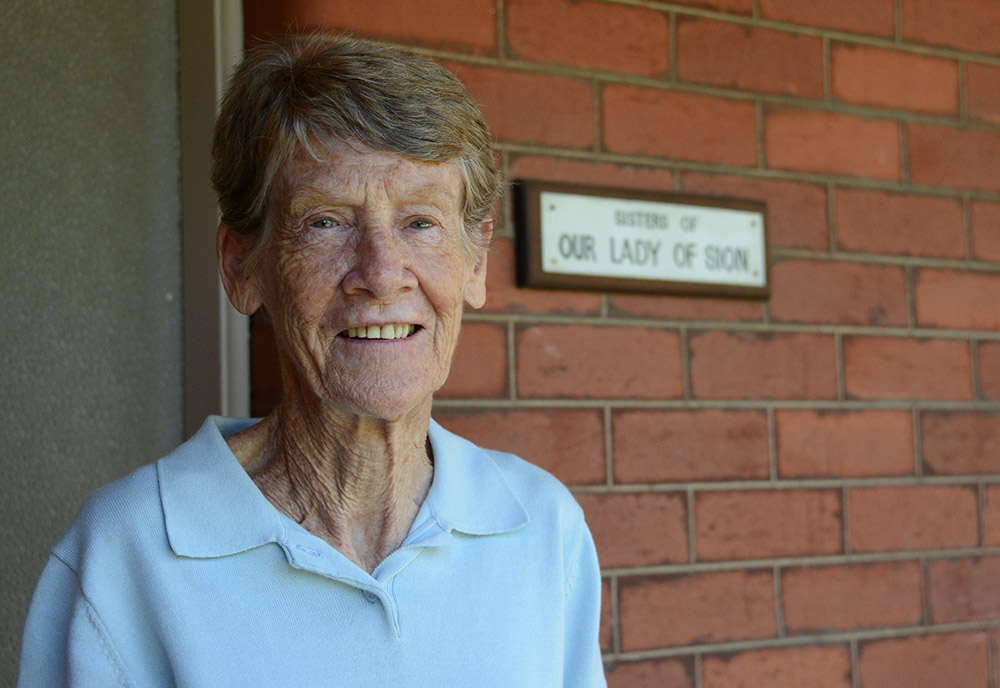
Our Lady of Sion Sr. Patricia Fox outside her home in Kew, a surburb of Melbourne, Australia (Fiona Basile)
More than three years after Sr. Patricia Fox was forced to leave the Philippines and return to her hometown of Melbourne, Australia, the Our Lady of Sion sister admits she is still adjusting to her new life. She'd been ministering for 28 years among poor agricultural workers across the Philippines, advocating for their rights to land, livelihood, peace, justice and security.
Fox was arrested at her convent in Quezon City, northeast Manila on April 16, 2018, and held overnight by Bureau of Immigration officials. The administration of President Rodrigo Duterte accused her of taking part in illegal political activities — attending protest rallies and visiting prisoners — and of speaking out against the government.
Following her release, Fox and her legal team for six months fought the cancellation of her visa and deportation. The legal battle ended abruptly on Oct. 31 at 4 p.m., when immigration officials told Fox that she had been ordered to leave the country by Nov. 3 or be deported. The bureau "played dirty," she said, by waiting until the last minute — just before two public holidays — to issue the order. She left under protest. "I had no choice but to leave."
Today, sitting in the comfort of the congregation's home base in Kew, a suburb of Melbourne, Fox explained that she is still "not settled in Australia. It all happened so quickly, and I wasn't prepared in those last days," said Fox, now 75. "We'd been fighting the deportation cases for months and months — much longer than we thought possible — and I'd been led to believe that I could stay in the Philippines at least until December when the appeal was being considered."
Consequently, Fox said, she "flew straight back to Melbourne in shock." She'd spent so many years immersed in the lives and struggles of the urban and rural poor, and had come to deeply love the people she served.
Upon her return, Fox was welcomed by the congregation's Australian regional director, Sr. Mary Barbuto and three other sisters, whom she now lives with.
Barbuto said, "Naturally, we welcomed Patty back — she's part of us and we've always been a small, close congregation here in Australia. It was a matter of giving Patty time to readjust to life back in Australia and supporting her in that transition."
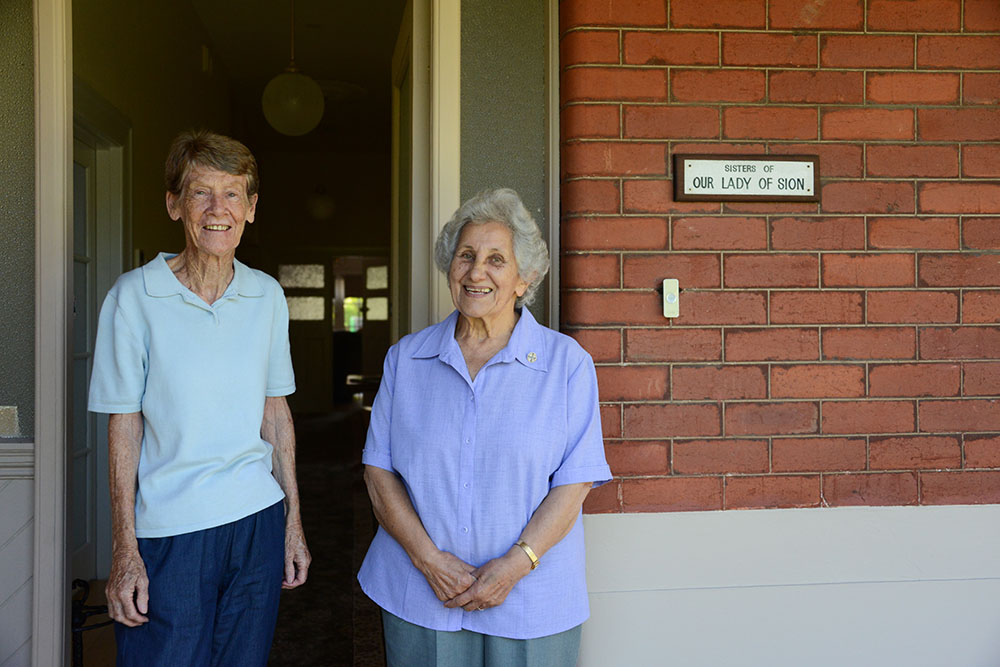
Our Lady of Sion Srs. Patricia Fox and Mary Barbuto, the regional coordinator for the congregation in Australia, at their home in Kew, Melbourne, Australia (Fiona Basile)
Having experienced moving out of a ministry she had loved, Barbuto said she could understand a lot of what Fox was going through.
To ease the change, Fox accepted many invitations to speak about her work and experience in the Philippines to local community and Filipino solidarity groups. She also traveled to cities in other states — Sydney, Perth, and Brisbane — giving talks. The experience "was very therapeutic," she said. "All the talking and talking and talking helped."
Difficult adjustment
For the first 12 months, "it was as though I was still in the Philippines," she recalled. As well as her speaking engagements, she joined rallies, meetings and online events. She kept in contact with friends and people who had been "very much a part of life back in the Philippines, though in a different capacity."
She'd been used to spending time with people in their homes and with their families, but now she was involved from a distance, in solidarity. "That's been a difficult adjustment for me. In fact, I still don't think I've adjusted to that," she said.
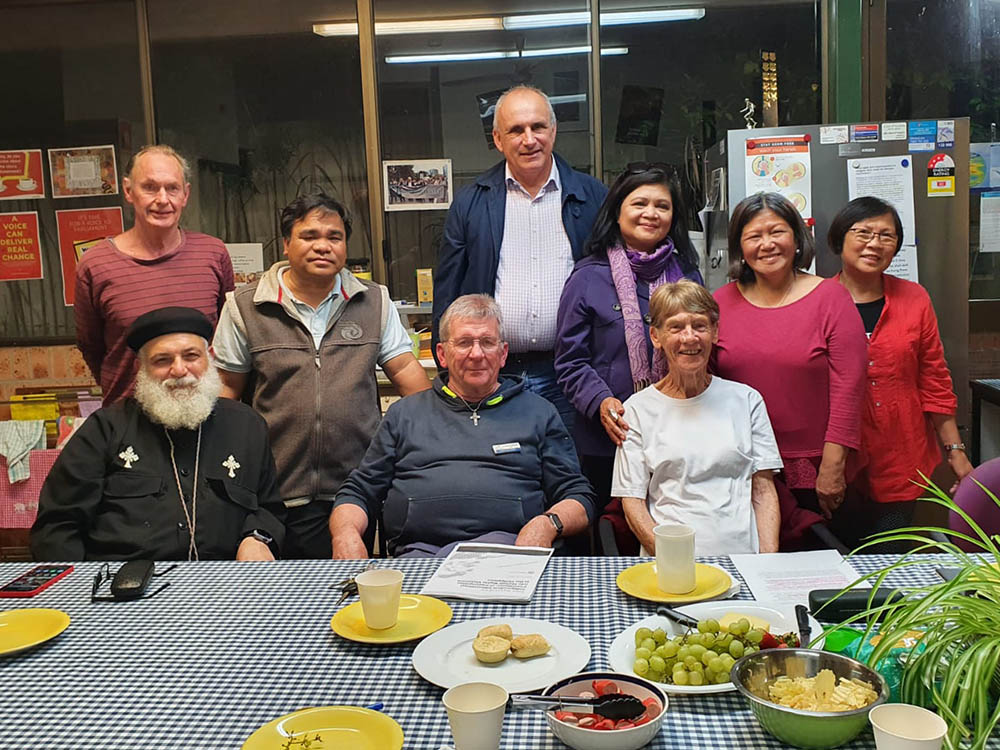
Sr. Patricia Fox at the Edmund Rice Center for Justice in Sydney in November 2019. She'd been sharing her experience in the Philippines with members of various Filipino solidarity groups. (Courtesy of Patricia Fox)
Fox misses the people and being with them in the joys and struggles of their everyday life. "Even though I lived in Quezon City, I knew the people around me and I had my local store where I bought the newspaper or bread," she said. "The neighbors were always around, and they'd say, 'You had a visitor today' or 'You have mail.' "
She learned the local language, joking that she "got by" with her "kangaroo Tagalog."
She was born and raised in suburbs of Melbourne, and attended schools run by Our Lady of Sion sisters. She says she was attracted to how well the sisters related to her and other students, particularly one sister who taught her in seventh and eighth grades and "was full of fun and really spent time with the so-called 'naughty kids.' I was a good kid, but she always took an interest in me."
Inspired by the sisters, Fox joined the congregation when she was 21. She was professed in the chapel of her college 50 years ago — she has just celebrated her jubilee.
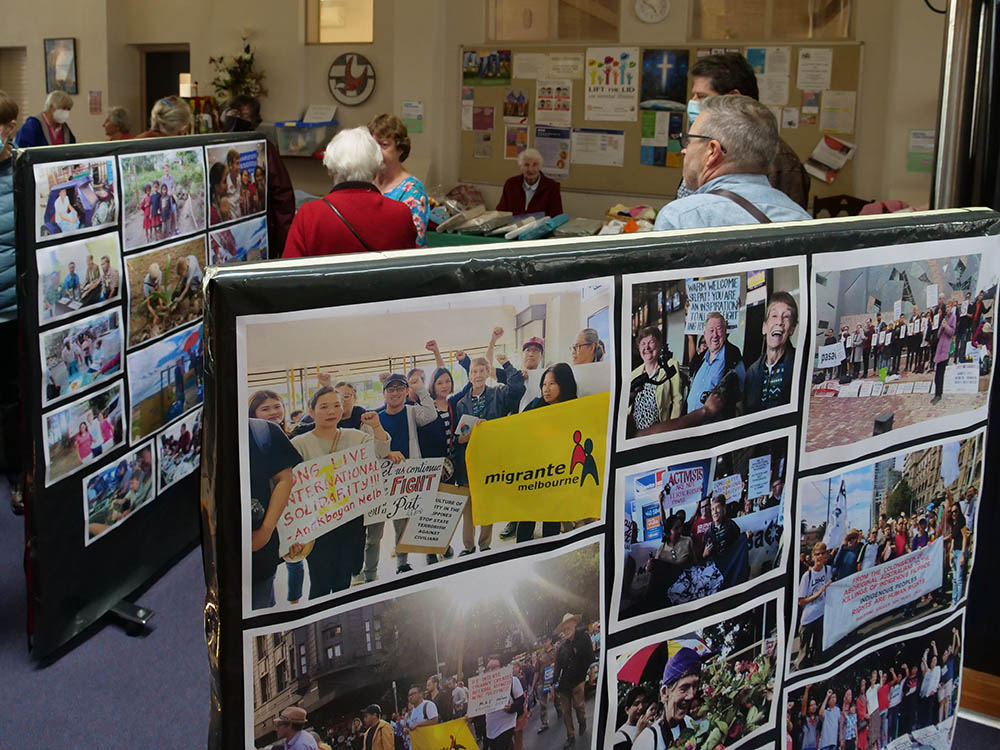
Photographs show the many facets of Our Lady of Sion Sr. Patricia Fox's missionary work in the Philippines and back in Melbourne, Australia. The display was featured at an April 2 ecumenical gathering at Dandenong Regional Uniting Church, in the southeast of Melbourne, to celebrate Fox's golden jubilee and 75th birthday. (Fiona Basile)
Her own heart was "sparked" by the plight of the struggling poor of the Philippines in the mid-1970s when she met a Filipina Franciscan Missionary of Mary in Israel, where she was based for three years — the Notre Dame de Sion congregation's roots are Jewish so it's common for sisters to spend time at their pilgrim house in Jerusalem's Old City.
The Franciscan sister spoke to Fox of her people's struggles and how they "took to the streets" protesting during the dictatorship of Ferdinand Marcos (1972-86). "She was dying to be back with her people, to be among them, and that really spoke to me," said Fox.
Liberation theology in practice
This experience highlighted for Fox liberation theology in practice, a topic she'd been reading about and interested in for years.
She returned to Australia to study law in Sydney and became involved in Filipino solidarity movements. She also volunteered at a local legal aid center.
In 1984, she had an opportunity to travel to the Philippines during a semester break of her studies. While there, she found "no distinction between the church and movement for justice. I met some amazing people who were so committed to being with the people, to being with their struggle for justice, and that stirred something within me."
The experience added to her growing desire to be among the poor, working for a world of justice and peace.
In 1986, the congregation held a general chapter where they discussed seeing the world through the eyes of the poor. They realized they weren't ministering in any parts of Asia where most of the people — the majority of whom are poor — are located.
After some research and having contacted several bishops and Fox visiting the Philippines again, this time with Sr. Oonah O'Shea, another Australian Notre Dame de Sion sister, the congregation decided to establish a presence in the Prelature of Infanta in Quezon province. Fox and O'Shea commenced their ministry in the Philippines in 1990.
The first year focused on getting settled and enculturated, but it didn't take long for Fox to take on more active and public roles in advocacy. "The Filipinos have a way of drawing you out," she said.
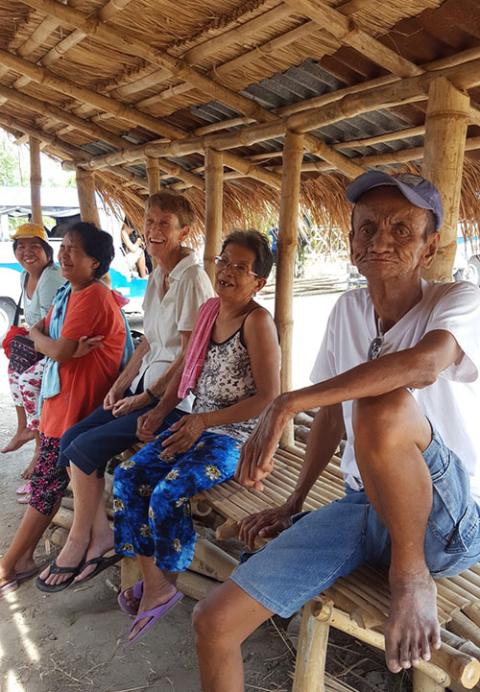
Our Lady of Sion Sr. Patricia Fox at a meeting in 2003 of a farmers' organization in Negros, one of the islands in the Visayas, Philippines (Courtesy of Patricia Fox)
She joined the Rural Missionaries of the Philippines in 1991 and became the regional coordinator of Central Luzon in 1998 and then national coordinator in 2000, a role she served in for seven years. Fox traveled extensively across the country, getting to know the farmers, fisherfolk and Indigenous tribal people, immersing herself in their stories and lives.
A lot of her work involved human rights advocacy, including speaking out on issues affecting the rural poor and working with them for change. She joined street protests, lobbied against mining companies that sought to strip farmers of their land, and visited military camps or prisons, trying to locate people who had been arrested.
Just prior to her own arrest, Fox had been involved in a fact-finding mission in Mindanao, in the southern Philippines. Together with representatives from church, farming and Indigenous groups, and a couple of "more progressive politicians," as she describes them, they investigated the deaths of several people who'd been defending their local lands and environment and visited others who'd been arrested.
Solidarity in Australia
Now back in Australia, Fox remains active in this ministry by focusing on solidarity work online with those in the Philippines and with like-minded groups in Australia.
She has joined Australian Catholic Religious Against Trafficking in Humans (ACRATH), working for the rights and protection of overseas agricultural workers, a subset of ACRATH's work to eliminate human trafficking across Australia and the Asia-Pacific region. And she is secretary of Pax Christi Victoria, which is part of Pax Christi Australia and International, advocating for peace across the world.
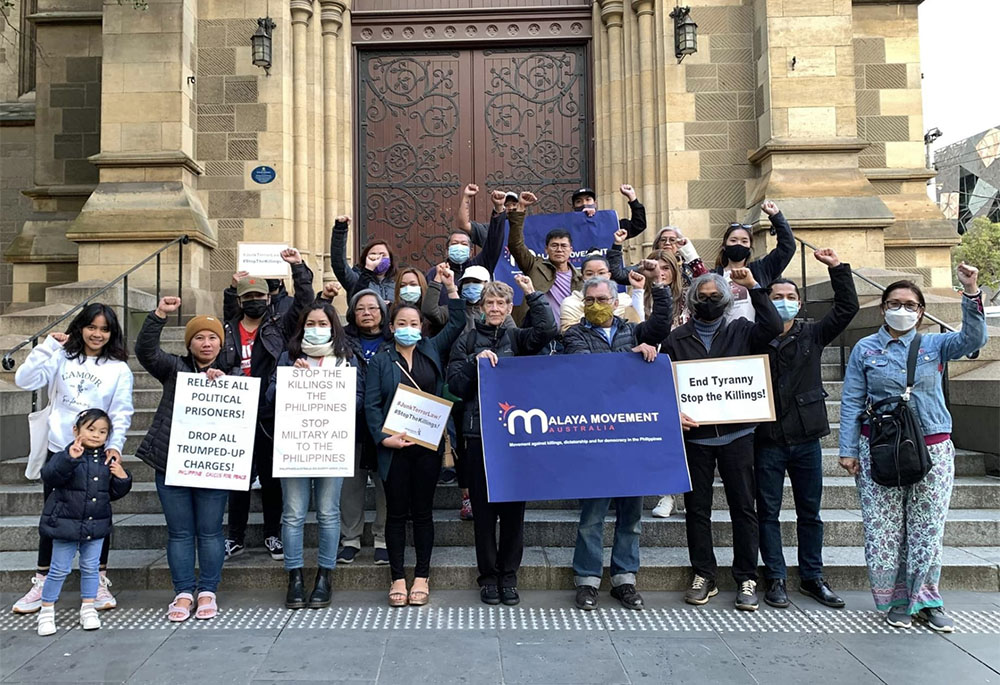
Sr. Patricia Fox joins members of the Philippines Caucus for Peace outside the Anglican St. Paul's Cathedral in Melbourne, Australia, marking International Human Rights Day on Dec. 10, 2021. (Courtesy of Patricia Fox)
Fox has given several talks at Pax Christi functions and parish settings focusing on human rights issues. Fox said she has "tunnel vision on human rights advocacy and raising awareness about the human rights violations in the Philippines."
As national elections in the Philippines approach on May 9, she said, "the violence has already started, with some people already being killed. We're constantly trying to monitor the situation and to get it out into the public."
This ties in with Fox's current lobbying to prevent Australia from providing military aid to the Philippines "as it's being used against the people," she said. "It's going to the military who are killing Filipino people, and we have to stop that. This is an ongoing issue and it's important for people to know what's going on, so we're doing letter-writing and lobbying members of parliament across Australia to stop the aid."
Reflecting on the violence inflicted on Filipinos, particularly those in rural areas fighting for their land against large mining corporations and the military who enforce the government's brutal policies, Fox believes "the violence has gotten worse" since her departure three years ago.
"The imprisonments have kept going, too, and no one is immune. Whether you're a politician, a religious, a farmer or worker, it doesn't matter. You are at risk."
She's also aware of the impact of the COVID-19 pandemic, which caused many rallies, meetings and movement among the people to stop.
The pandemic has only compounded the situation for poor rural and urban dwellers, unable to access adequate health care or COVID-19 tests, Fox explained. "Some of the young farmer organizers that I knew sent me a message saying, 'Can you send over some money because we need to get tested' — it was 4,000 pesos [approximately AU$110 or US$77] or something like that per test and these are people struggling to put rice on the table."
'I really feel the distance'
Fox is also mourning two friends in the Philippines who recently died, she believes, at least in part because of actions by the repressive government. One died of COVID-19 while in custody last year, arrested on false charges, she said. The other was a National Democratic Front peace negotiator she had worked with who was tortured and killed a year ago. Fox suspects government agents were behind the killing, but nothing has yet been proven.
"So that's hard because at times like that, I'd love to be there with the family, just to hug the family," she said. "That's when I really feel the distance. I used to love being with the people, the closeness, and how I was so much a part of their lives, and how much I loved being in the rural areas with the people."
Fox takes some consolation in knowing there were some "small victories" for those for whom she advocated. She had spent several years with the Justice and Peace Action group in Aurora, a rural and mountainous area north of Manila, where land was under threat from mining and logging companies. Working with local farmers and Indigenous peoples to gather information and data and engaging with government offices, including the Department of Environment and Natural Resources, mining never commenced in the area. Fox attributed this to the "strong and coordinated movement" of everyone involved.
"You could see the confidence growing in those speaking out for their rights," she said.
She was also heartened when farmers were granted land from corporations, enabling them to grow their own vegetables and crops. "They were so excited to be able to offer you something when you visited. They have such dignity even though they were still so poor and still under some threat."
Fox was motivated in being with the people because of their "determination, enthusiasm, love and support." And, she added, "their sense of humor! Despite everything, they have a sense of humor and manage to make a joke about everything."
Advertisement
She also takes some solace in knowing that there are still seven other Our Lady of Sion sisters in the Philippines ministering in various capacities — conducting biblio-drama with different groups, ecumenical church work in supporting poor communities around Manila, educating children, counseling and supporting a women's cooperative. One of the sisters is employed by the Department of Social Welfare.
Even though she is not personally in touch, Fox is determined to remain connected with those fighting for justice in the Philippines, and to make their issues and struggles known in Australia. She has been chair since last year of the Australian chapter of the International Coalition of Human Rights in the Philippines, a role that keeps her informed of abuses that are taking place. Only last month, she received a message that the military had ambushed and killed five people — two teachers, a health worker and two drivers — who were involved with an Indigenous school in Mindanao.
In difficult times, Fox finds consolation and inspiration in spending time in nature and in reflecting on Bible passages. Two of her favorite Scriptures include Isaiah 65:17-25 and Isaiah 42:1-4.
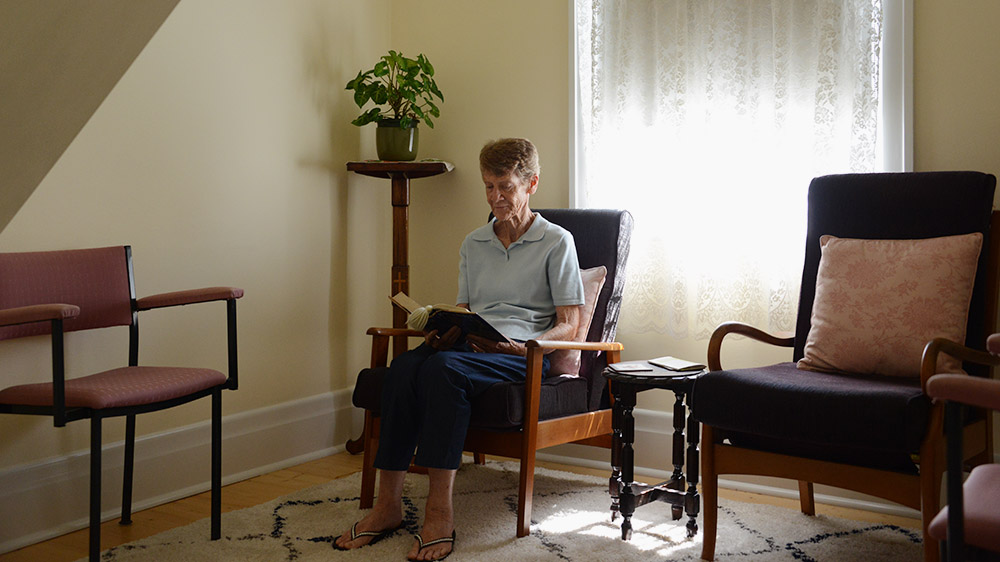
Our Lady of Sion Sister Pat Fox in the prayer room of her home in Kew, Melbourne, Australia (Fiona Basile)
"That idea, that no one will build a house and not live in it, no one will plant fruit and not eat it, no one dies young, the farmers will be able to get what their produce is. It's a beautiful reading," Fox said. "That first passage meant a lot in the Philippines, where I saw children dying, and people who grew food going hungry. And the second passage is a reminder that God is acting when sometimes it really doesn't look like it."
Fox celebrated the 50-year anniversary of her profession in January. Several friends from the Philippines gathered on Zoom to celebrate the special occasion and there was a small gathering among the sisters for prayer and afternoon tea. On April 2, there was an ecumenical celebration at the Dandenong Regional Uniting Church, in the southeast of Melbourne, in recognition of Fox's golden jubilee and 75th birthday.
She is hopeful that the national elections in the Philippines will see a change in government that will allow her name to be struck off the blacklist so that she can return, or at least visit, sooner than later. If not, in two years she can apply to the courts to have her name struck off the list.
In anticipation, she joked, her "bags are packed."

